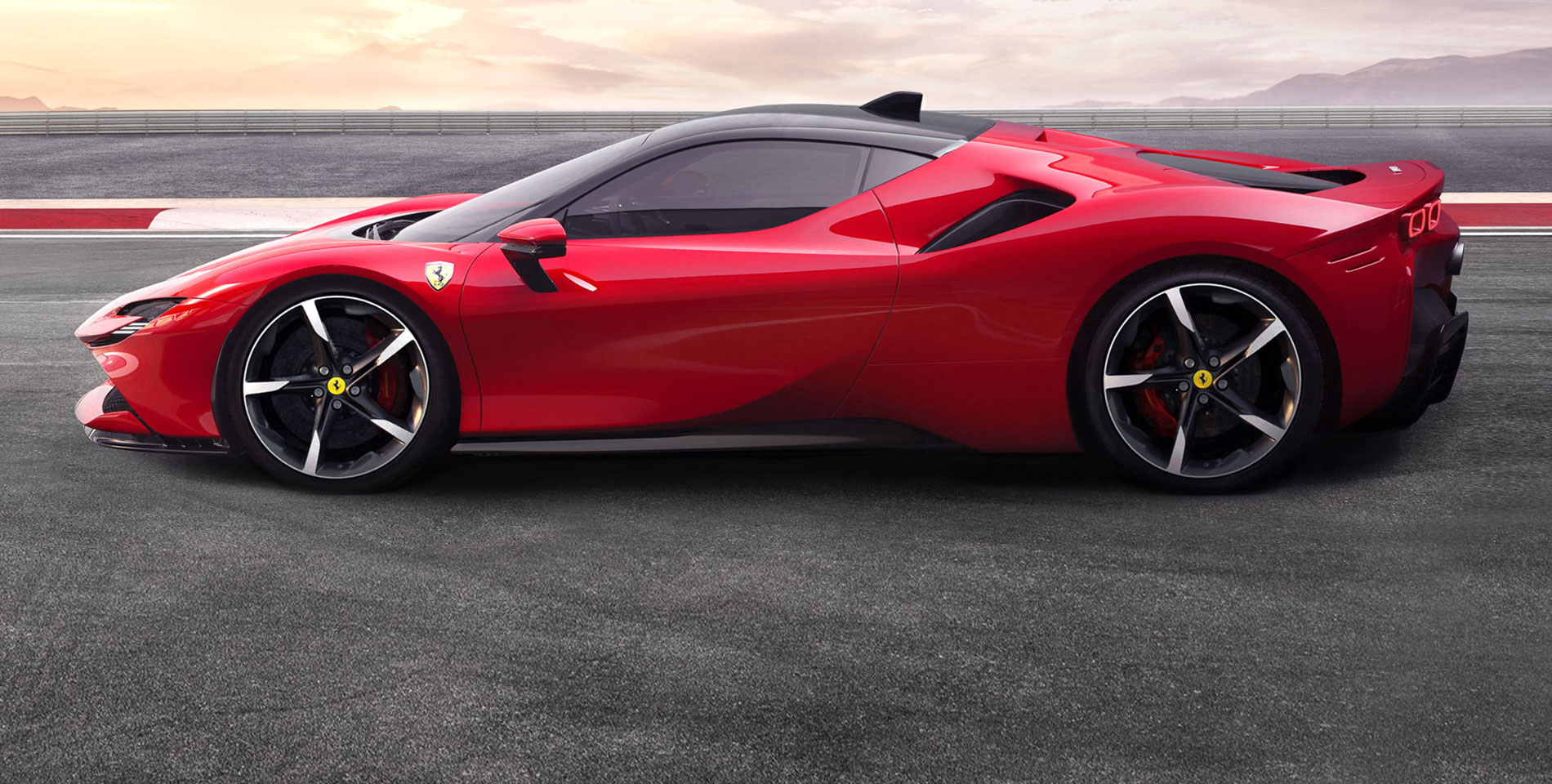SF90 Stradale
The car’s name encapsulates the true significance of all that has been achieved in terms of performance. The reference to the 90th anniversary of the foundation of Scuderia Ferrari underscores the strong link that has always existed between Ferrari’s track and road cars. A brilliant encapsulation of the most advanced technologies developed in Maranello, the SF90 Stradale is also the perfect demonstration of how Ferrari immediately transitions the knowledge and skills it acquires in competition to its production cars.
Beyond Performance
The SF90 Stradale is the first ever Ferrari to feature PHEV (Plug-in Hybrid Electric Vehicle) architecture which sees the internal combustion engine integrated with three electric motors, two of which are independent and located on the front axle, with the third at the rear between the engine and the gearbox.The internal combustion engine, gearbox, turbo-charged air, battery pack and electric motors, the inverters and charging systems and brakes all need cooling. Meticulous attention was paid to the design of the engine bay which houses both the usual internal combustion engine systems that generate temperatures of nearly 900°C, and highly temperature-sensitive electronic components.
Driving Pleasure For Every Driver
The exceptional work done to boost the power unit’s power would have all been in vain without in-depth dynamics research and the development of a whole series of solutions to boost the SF90 Stradale’s lap times, whilst simultaneously guaranteeing that drivers of all kinds could make full use of the car’s potential and have fun behind the wheel. The new hybrid architecture required extensive and lengthy integration work on the car’s many different control logics. The three areas concerned are: the high-voltage system controls (battery, RAC-e, MGUK, inverter), engine and gearbox control and vehicle dynamics controls (traction, braking, Torque Vectoring).
A Future-Fowarded Design
The SF90 Stradale is the most advanced car in the range from a point of view of performance and technology. The definition of the exterior styling was inspired by that principle: to create a forward-looking, innovative design that transmits the car’s mission as an extreme sports car – Ferrari’s first series production supercar. Ferrari Design has thus completely revisited the proportions of the front, central and rear volumes in a radical evolution of the forms of Ferrari’s mid-rear-engined production berlinettas of the last twenty years.


769
Hp
at 8000 rpm
211
mph
330 km/h
2.5
sec
0-100 km/h
590
lb⋅ft
at 3000 rpm
V9 – 90
rpm
8000
Specifications
ENGINE
| Type | V8 – 90° |
| Battery Capacity | 7,9 kWh |
| Maximum Power Electric Motors | 162 kW |
| Compression Ratio | 9.5:1 |
| Maximum Power | 769 hp @ 7500 rpm |
| Total Displacement | 3990 cc |
| Maximum torque | 590 lb⋅ft @ 6000 rpm |
| Gearbox | F1 8-Speed Dual-clutch |
Dimensions and Weight
| Length | 185.43 in |
| Width | 77.63 in |
| Height | 46.69 in |
| Wheelbase | 104.33 in |
| Front Track | 66.10 in |
| Rear Track | 65 in |
| Boot Capacity | 74 L |
| Dry Weight | 7630 lbs |
| Weight Distribution | 45% ant – 55% post |
| Rear Shelf Capacity | 20 l |
LOCATION
Miller Motorcars
342 West Putnam
Greenwich, CT 06830
Sales Hours
Monday Friday 9:00am 6:00pm
Saturday 9:00am 4:00pm
Sunday: Closed
Service Hours
Monday Friday 7:30am 5:00pm
Saturday: Closed
Sunday: Closed

* Images, prices, and options shown, including vehicle color, trim, options, pricing and other specifications are subject to availability, incentive offerings, current pricing and credit worthiness.The advertised price does not include sales tax, dealer conveyance fee of $599, vehicle registration fees, other fees required by law, finance charges and any documentation charges.
We make every effort to ensure the accuracy of the information on this site, however errors do occur. Please verify all information with a sales associate by calling or e-mailing us.
If a person writes a check without sufficient funds in an associated account to cover it, the check will bounce, or be returned for insufficient funds. Each state has laws regulating how merchants may respond to bounced checks. In Connecticut, the merchant may file a civil suit and press criminal charges if the check writer does not reimburse him for a bounced check after the merchant has sent several notices regarding the matter.
Posted Notice Requirement
Merchants and other business owners who accept checks must post a notice where customers are likely to see it warning them of the potential consequences of writing bad checks. The notice must include the civil penalties that bad check writers may face, the appropriate Connecticut statute number and an advisory that the check writer may also face criminal penalties
Civil and Criminal Penalties
As of 2010, civil courts may require the check writer to reimburse the merchant for the value of the check plus pay up to $750 if he has no back account or $400 if the check is returned for insufficient funds. If the merchant chooses to press criminal charges, the bad check writer may face a fine of up to $1,000 and up to one year in jail. Writing a bad check is a felony charge if the check was for more than $1,000 and a misdemeanor if written for a lesser amount.
Required Written Notices
If a check bounces, the merchant must send the check writer a letter by certified mail at the check writer's last known address or place of business. Usually this letter is sent to the address on the writer's check. The letter must inform the writer that the check was returned ask him to reimburse the merchant for the amount of the check and inform him of the potential criminal or civil penalties if he fails to do so. If the check writers does not respond to the letter within 15 days of receipt, the merchant must send a second letter. This letter must inform the check writer that he has 30 days to reimburse the merchant before the merchant takes legal action against him. Both letters must be written in both English and Spanish.





















